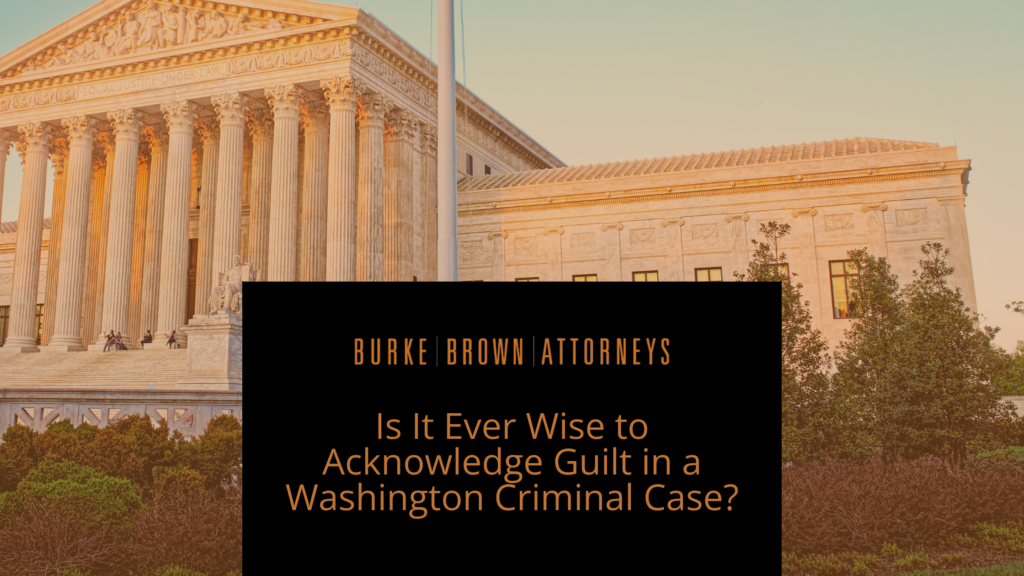
Are you guilty or innocent? As you may know, the answer to that question doesn’t always directly correlate to the outcome of a legal case. How you handle your answer to that question, however, is paramount to the outcome of your Washington criminal case.
Under the law, you are innocent until proven guilty.
Defendants sometimes are too loose with talking, when the law does not require them to talk or admit guilty. You have a constitutional right to remain silent i.e., not to talk. You also have a constitutional status of innocent until proven guilty.
Giving up your right to remain silent may put you in a lose-lose situation. On the other hand, explaining yourself and taking responsibility might actually advance your cause. BUT it’s about knowing when and why to do so and what doing so will accomplish. A client’s goals need to be considered before proceeding with any sort of statement or confession, whether the goal is to end the case quickly or even to appear remorseful and responsible for your actions.
Before you take such a decisive step, caution and counsel are essential. Acknowledging guilt might be an advantageous move but never do so without obtaining the assistance of an attorney. This is especially true when talking to the police, but it applies to all conversations you have prior to retaining an attorney. Remember, it’s your right to remain silent.
Is It Okay to Admit Guilt to Family and Friends?
It’s natural to want to confide in those closest to you during trying times. However, those “private” conversations are not as private as you may believe. They can find their way into a courtroom, transforming your words to a close confidant into evidence against you.
Trust is a precious commodity, but even those with the best intentions may not be able to defend you when they themselves are facing possible perjury or dodging a subpoena. The question is not just whether they are trustworthy, but also whether it’s reasonable to expect them to commit a crime for your sake. A witness is only allowed to “plead the fifth” if the answer would directly implicate them in a crime.
Until you’ve received legal advice, it’s prudent to avoid admitting guilt to anyone, loved ones included.
Will Admitting Guilt Accomplish Your Goals?
Understanding your objectives is crucial when navigating a Washington criminal case. The team at Burke Brown Attorneys wants to get to know you, your situation, your goals, and the evidence at hand.
We take all of this information and empower you to make informed decisions. If your aim is to emerge from your legal difficulties unscathed, but the evidence against you is insurmountable, an admission of guilt alone is unlikely to accomplish that goal. However, if your goal is resolution, regardless of the consequences, negotiating with the prosecutor may indeed be the best path forward. Going to trial may be the best option if you’re willing to take a risk for a chance at complete exoneration.
Again, this choice must factor in your goals in your case and the reality of the legal situation you face. You need to consider how realistic your goals are and whether or not taking responsibility will get you closer to them.
Admitting Guilt as a Strategy
Admitting wrongdoing isn’t just about accepting defeat and facing the consequences. It’s a strategy. You have the opportunity to receive a favorable outcome by negotiating behind closed doors with the prosecutor.
Prosecutors often value a defendant’s willingness to accept responsibility and to make amends for their actions. Fighting the truth can produce the desired result, but you risk prosecution and more significant penalties if your case is dragged through an entire trial. Alternatively, a trial may be the only proper strategy if you are unjustly charged.
All Prosecutors are Different
It is also a factor that a prosecutor has all the power to decide what they are willing to negotiate and what is important in your case. Some prosecutors do not care about acceptance of responsibility and it does not sway them to look at you favorably for taking responsibility. This is another reason to get an experienced defense attorney who can help you decide strategy decisions like this.
Whether or When to Admit Guilt
At Burke Brown Attorneys our role is to lay out all possible options, crafting a legal strategy that aligns with the realities of the case and the client’s personal objectives.
Admitting guilt is not the sole option ; it might be one of many strategies that could be employed successfully depending on your goals. If you’re facing criminal charges and need to develop a sound defense strategy, our team is ready to assist you. Contact Burke Brown Attorneys, PLLC, to get started on your criminal defense strategy today.
Burke Brown Attorneys
Latest posts by Burke Brown Attorneys (see all)
- What Options Do You Have When CPS is Weaponized Against You? - April 3, 2024


